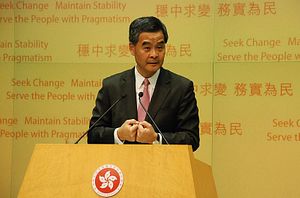Hong Kong’s newly elected legislators are already creating headaches for the incumbent Chief Executive Leung Chun-ying (aka CY Leung). Independent Eddie Chu Hoi-dick, a well-known environmental activist turned lawmaker, questioned Leung on why the government decided to pursue a 4,000-flat public housing development plan on a designated greenbelt, rather than an original plan that would have seen the development built on an existing ruined agricultural plot, yielding a total of 17,000 flats.
Housing is a contentious issue in Hong Kong, arguably the world’s most expensive city, and with one of the greatest income disparities in the developed world based on the GINI index. Chu has accused the government of colluding with triads and businesses in releasing public lands for development.
The question comes on the back of alleged death threats that have forced Chu and his family to move into hiding from his home. Chu is a vocal opponent to the Heung Yee Kuk, the rural sector functional seat that represents the interests of indigenous land owners (and significant landlords). Police are understood to be investigating a triad gang based in the northwestern New Territories district of Yuen Long, as well as a rural strongman, in relation to the 4,000-flat development at Wang Chau, also in Yuen Long, according to the South China Morning Post.
Following the question from Chu, local media outlet Apple Daily cited documents that show the government had held secret talks with rural sector representatives in 2013. Pro-Beijing Legislative Councillor Leung Che-cheung corroborates the documents, and said the lobbying struck him as strange at the time, as it was unusual to have the Deputy Housing Director Ada Fung Yin-suen represent the government rather than somebody from the Development Bureau or the Lands Department, given much of the land was not without dispute.
CY Leung has come out swinging. After initially denying his involvement in the lobbying, he has since conceded that he had chaired the task force that met only once in June 2013, and that the task force was led by Finance Secretary John Tsang Chun-wah and Chief Secretary Carrie Lam Cheng Yuet-ngor. Tsang has been widely flagged as potential contender to CY Leung for the top job at the next elections in 2017.
Progressive democratic Lawmaker-elect Edward Yiu Chung-yim, from the architectural, surveying, planning, and landscape sector functional seat, said that it would still be strange for CY Leung to chair such a task force, calling on the chief executive to be transparent about his role in the matter.
To further add to CY Leung’s woes, both Tsang and Lam have denied their involvement. The government is under enormous pressure to explain its actions in the face of Chu’s accusations. Cracks are appearing, and politics are in motion. The longer it takes for the government to come up with an explanation, or an excuse, the worst it will look for CY Leung and his aspirations for resuming his role as the chief executive next year.
































